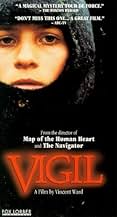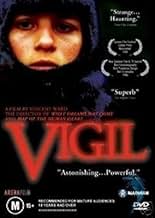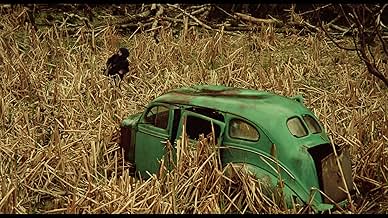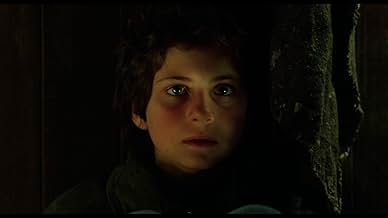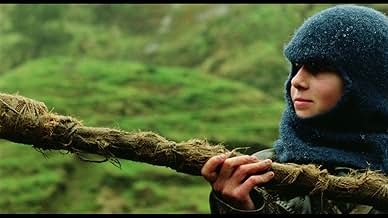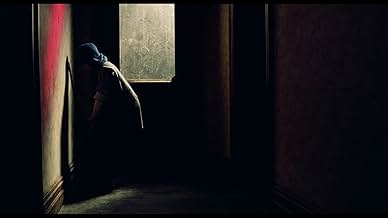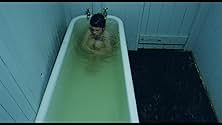A lonely girl living on an isolated, mist-cloaked farm is confronted with the changes wrought by a stranger that arrives.A lonely girl living on an isolated, mist-cloaked farm is confronted with the changes wrought by a stranger that arrives.A lonely girl living on an isolated, mist-cloaked farm is confronted with the changes wrought by a stranger that arrives.
- Director
- Writers
- Stars
- Awards
- 3 wins & 2 nominations total
- Director
- Writers
- All cast & crew
- Production, box office & more at IMDbPro
Featured reviews
Vincent Ward's work in this film reminded me of the use of images by Bergman in his early films. Rough country, silhouetted figures, unexpected angles and movement, an avoidance of bright colour.
We have to struggle to get to know the characters a little, and that is what I found was drawing myself in to the film. Ward could be accused of not telling the story fully enough. I found that his style kept me wondering what might happen next.
We have to struggle to get to know the characters a little, and that is what I found was drawing myself in to the film. Ward could be accused of not telling the story fully enough. I found that his style kept me wondering what might happen next.
My Rating : 8/10
'Beans up your...'
'Vigil' is about a lonely young girl living with her family on an isolated, mist-cloaked farm and the disturbing realities she faces along the way.
Beautiful, funny and grand - don't be fooled by it's minimalist settings but try and look for the primal feelings of childhood which is captured so wonderfully.
Highly recommended.
'Beans up your...'
'Vigil' is about a lonely young girl living with her family on an isolated, mist-cloaked farm and the disturbing realities she faces along the way.
Beautiful, funny and grand - don't be fooled by it's minimalist settings but try and look for the primal feelings of childhood which is captured so wonderfully.
Highly recommended.
I grew up in the frames of "Vigil". Not to say that I was born in New Zealand - rather, I spent my early years in the lonely valleys and hillsides of Nova Scotia. But this film captures the desperate sense of isolation, the profound and perfect life buried beneath year after year of aching dreamtime, heartwaking nights beneath stars, mornings of fog that weigh you down with the power of all the heavens.
"Vigil" understands childhood. From the confusion of relationships, to the expression of emotion, the distance of adults, and the impetuosity and irrationality of youth. The wisdom of the young, held back without even the slightest consideration for right and wrong. The final answers to questions like "Why was I born?" and "Why am I me and not someone else?". The final answers that are really just acceptances. Eternal questions. For most of my life, since I was the very same age as the girl depicted in this story, I've been looking for a film that captured children as they really are, as they really behave, instead of just some adult's idea of how they act. This catches that elusive sense. For the first time, it puts me inside the childlike mind, lets me see through the same eyes that I once had. Unlike so many, I haven't forgotten what it was like to be this age, what it was really like. No other film understands childhood with such straight purity as this.
The sight of "Vigil" is like riding in a car with snowy windows. Like finding yourself in a poorly insulated house as the glass develops ice crystals and blurs your vision of the outside world. "Vigil" is life through a glass darkly. Alun Bollinger, the cinematographer, seems to see beyond the level of possibility. Beyond what naturalistic photography can conceivably capture. He takes the solid and safe and turns it deadly. Takes the inanimate and makes it breathe. It's as if horses were dreams and you find yourself riding nightmares in the pasture. It's dark and cold, yet full of life and light. Even the shadows tell of light. For if one is capable of perceiving the beauty of light, there is no end of it to be found in a film like "Vigil".
If a man like Vincent Ward had an achievement in life, a reason to be an artist, this film is that. He creates a tale of such perfection, such breath and personification, that I never realized how desperately I'd been searching my whole life for it to come around. With his co-writer, Graeme Tetley, a story of believability and human understanding has been woven together so tight, so pure, that I can't even speak of cinematic considerations. I can't think of undue questions or dissections. The reality is complete. For scene after scene, a solid image is perfectly presented, composed. Faces, houses, a derelict car, a jousting match. Nothing is weak. Nothing is unimportant.
This is the fifth film I've seen by Vincent Ward. One of them (What Dreams May Come) engaged me, but the visuals kept a distance. Two others (River Queen and Map of the Human Heart) were held back by unconvincing performances, though they were engaging otherwise. The Navigator, which he made four years later, is another truly great film - though of a much different style. But I'm not thinking of other films tonight. I'm dreaming of this world, and taking my vigil at the window. Tonight is calm, and the early Autumn air has settled outside my home in the Annapolis Valley. I'm thinking of the images I've seen, feeling changed and refocused, picked up out of my depression. This story has re-awoken the most desperate parts of my soul. It has left me with, to quote a song, "that grand dark feeling of emptiness".
For more of this feeling: Days of Heaven (1978), The Black Stallion (1979), Never Cry Wolf (1983), Tender Mercies (1983), The Stone Boy (1984), Ironweed (1987)
"Vigil" understands childhood. From the confusion of relationships, to the expression of emotion, the distance of adults, and the impetuosity and irrationality of youth. The wisdom of the young, held back without even the slightest consideration for right and wrong. The final answers to questions like "Why was I born?" and "Why am I me and not someone else?". The final answers that are really just acceptances. Eternal questions. For most of my life, since I was the very same age as the girl depicted in this story, I've been looking for a film that captured children as they really are, as they really behave, instead of just some adult's idea of how they act. This catches that elusive sense. For the first time, it puts me inside the childlike mind, lets me see through the same eyes that I once had. Unlike so many, I haven't forgotten what it was like to be this age, what it was really like. No other film understands childhood with such straight purity as this.
The sight of "Vigil" is like riding in a car with snowy windows. Like finding yourself in a poorly insulated house as the glass develops ice crystals and blurs your vision of the outside world. "Vigil" is life through a glass darkly. Alun Bollinger, the cinematographer, seems to see beyond the level of possibility. Beyond what naturalistic photography can conceivably capture. He takes the solid and safe and turns it deadly. Takes the inanimate and makes it breathe. It's as if horses were dreams and you find yourself riding nightmares in the pasture. It's dark and cold, yet full of life and light. Even the shadows tell of light. For if one is capable of perceiving the beauty of light, there is no end of it to be found in a film like "Vigil".
If a man like Vincent Ward had an achievement in life, a reason to be an artist, this film is that. He creates a tale of such perfection, such breath and personification, that I never realized how desperately I'd been searching my whole life for it to come around. With his co-writer, Graeme Tetley, a story of believability and human understanding has been woven together so tight, so pure, that I can't even speak of cinematic considerations. I can't think of undue questions or dissections. The reality is complete. For scene after scene, a solid image is perfectly presented, composed. Faces, houses, a derelict car, a jousting match. Nothing is weak. Nothing is unimportant.
This is the fifth film I've seen by Vincent Ward. One of them (What Dreams May Come) engaged me, but the visuals kept a distance. Two others (River Queen and Map of the Human Heart) were held back by unconvincing performances, though they were engaging otherwise. The Navigator, which he made four years later, is another truly great film - though of a much different style. But I'm not thinking of other films tonight. I'm dreaming of this world, and taking my vigil at the window. Tonight is calm, and the early Autumn air has settled outside my home in the Annapolis Valley. I'm thinking of the images I've seen, feeling changed and refocused, picked up out of my depression. This story has re-awoken the most desperate parts of my soul. It has left me with, to quote a song, "that grand dark feeling of emptiness".
For more of this feeling: Days of Heaven (1978), The Black Stallion (1979), Never Cry Wolf (1983), Tender Mercies (1983), The Stone Boy (1984), Ironweed (1987)
This film is a portrayal of a lonely and isolated childhood. It really has a dreary feel with all the darkness and fog. It is good at setting a tone of uncertainty and foreboding.
SPOILER: I don't know when I've seen a film that was so beautiful and yet so utterly baffling. It's not like any other movie you'll ever see. Every single image is stark and brutal--the director, Vincent Ward, is trying to enter a primitive painting and make drama out of it. And he has a perfect setting--a sheep farm in New Zealand--that comes from Thomas Hardy's accounts, in which nature wages an unending, unfathomable conspiracy against the characters. It's in the actual story Ward tells that he gets into trouble. His 12-year-old heroine, Toss (Fiona Kay) witnesses her farmer father's death from an accidental fall (as he tries to rescue a sheep) and the camera sits on her impassive face for the first of several eternities. Her restless mother (Penelope Stewart) seizes the opportunity to put the farm up for sale. Her dotty grandfather (Bill Kerr) is like every dotty grandfather in the movies--he putters around, muttering feisty-old-goat aphorisms and tinkering with whimsical machines--and quickly becomes insufferable. Ethan, (Frank Whidden) the hunter who carried the father's corpse back to the farm, shows up again looking to replace the father. Toss and her mother are both attracted and repelled by him.
In one remarkable sequence, we see Toss experimenting with Ethan's gun. She looks through the gun sights and begins tracking Ethan through the house, as if she were ambushing James Bond. When Ethan sees her, he steps boldly toward her and removes the sight, which she had taken off the gun and is holding to her eye like a telescope. We are in D.H. Lawrence sexual-awakening territory now, but the combination of Lawrence and Hardy doesn't ignite the way it should--the director's austere manner (keeping everything at a distance) begins to seem remote and rather obscure. The scenes don't follow from each other; each one goes off on its own, and the characters shift attitudes and allegiances to no clear purpose. The performers start doing a lot of staring and squinting into the camera (for LONG periods) only Stewart makes any impression, as she's the only one who actually engages with the person she's speaking to (and the only one who seems to have any grasp on reality.) The last fourth of the movie is unspeakably depressing. We finally realize that this is the kind of film where explanations and logic are left out, and the resultant confusion is presented as "depth". Fascinating and infuriating, in just about equal measure.
In one remarkable sequence, we see Toss experimenting with Ethan's gun. She looks through the gun sights and begins tracking Ethan through the house, as if she were ambushing James Bond. When Ethan sees her, he steps boldly toward her and removes the sight, which she had taken off the gun and is holding to her eye like a telescope. We are in D.H. Lawrence sexual-awakening territory now, but the combination of Lawrence and Hardy doesn't ignite the way it should--the director's austere manner (keeping everything at a distance) begins to seem remote and rather obscure. The scenes don't follow from each other; each one goes off on its own, and the characters shift attitudes and allegiances to no clear purpose. The performers start doing a lot of staring and squinting into the camera (for LONG periods) only Stewart makes any impression, as she's the only one who actually engages with the person she's speaking to (and the only one who seems to have any grasp on reality.) The last fourth of the movie is unspeakably depressing. We finally realize that this is the kind of film where explanations and logic are left out, and the resultant confusion is presented as "depth". Fascinating and infuriating, in just about equal measure.
Did you know
- TriviaFirst ever film from New Zealand to be selected to screen in competition at the Cannes Film Festival.
- Quotes
Ethan Ruir: What are you after?
Elizabeth Peers: I want you to keep your hands off my daughter.
- How long is Vigil?Powered by Alexa
Details
- Release date
- Country of origin
- Official sites
- Language
- Also known as
- Vigil - Zeit der Stürme
- Filming locations
- Production companies
- See more company credits at IMDbPro
Contribute to this page
Suggest an edit or add missing content


